Neuroethics BooksThe views and opinions expressed in the following publications are solely those of the authors and do not represent the policies, positions, views, or opinions of the International Neuroethics Society and its members. Contact staff to recommend books for this page. Listed chronologically with running and completed series and sets listed at the bottom.
 Brain Science for Lawyers, Judges, and PolicymakersOwen D. Jones, Jeffrey D. Schall, Francis X. Shen, Morris B. Hoffman, and Anthony D. Wagner / Oxford University Press, 2024 / ISBN: 9780197748855 Brain Science for Lawyers, Judges, and Policymakers responds to the rapidly changing legal landscape, providing a user-friendly introduction to the fundamentals of neuroscience for lawyers, advocates, judges, legal academics, and policymakers. It features detailed but clear illustrations, as well as a comprehensive and accessible overview of developments in legally relevant neuroscience. Readers will learn brain science terms, how to understand and discuss brain structure and function in legally relevant contexts, and how to avoid over- or under-interpreting neuroscience evidence. 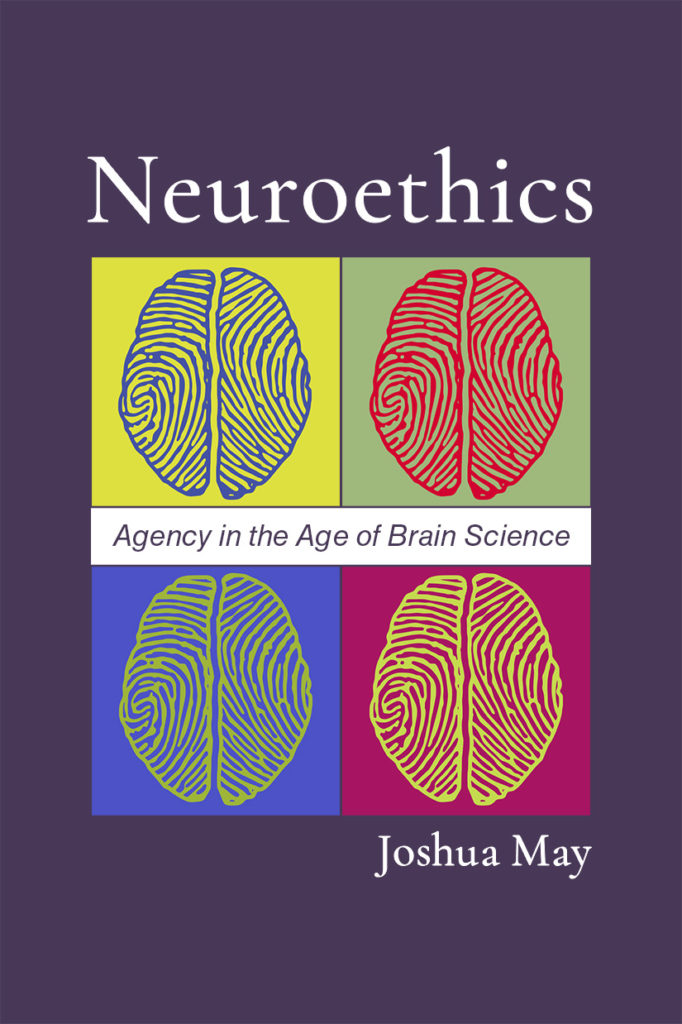 NeuroethicsAgency in the Age of Brain Science Is free will an illusion? Is addiction a brain disease? Should we enhance our brains beyond normal? Neuroethics blends philosophical analysis with modern brain science to address these and other critical questions through captivating cases. The result is a nuanced view of human agency as surprisingly diverse and flexible. With a lively and accessible writing style, Neuroethics is an indispensable resource for students and scholars in both the sciences and humanities. (See the book webpage for a discount when purchasing the book from Oxford University Press.) 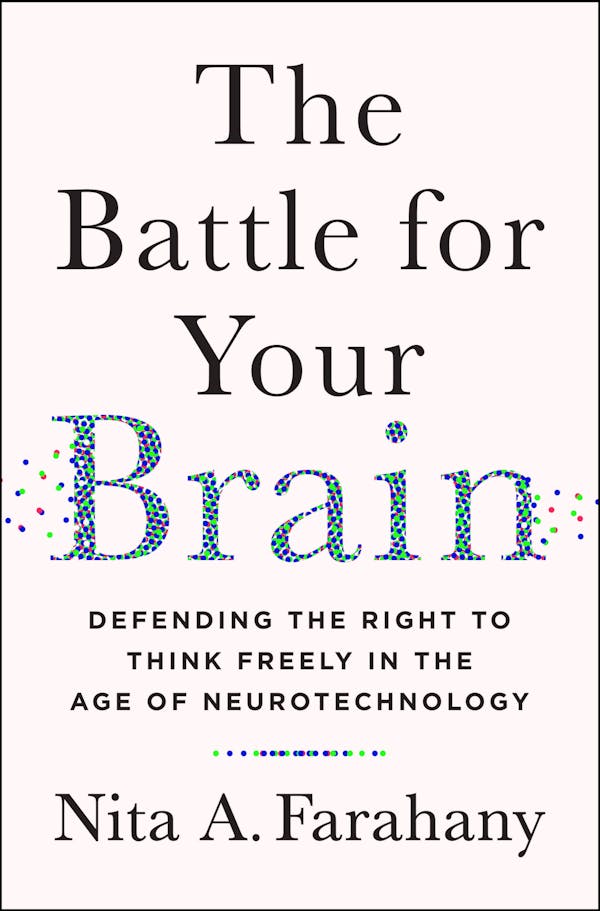 The Battle for Your BrainDefending the Right to Think Freely in the Age of Neurotechnology From one of the world’s foremost experts on the ethics of neuroscience, The Battle for Your Brain offers a path forward to navigate the complex legal and ethical dilemmas that will fundamentally impact our freedom to understand, shape, and define ourselves.  The Unfit Brain and the Limits of Moral BioenhancementFabrice Jotterand / Palgrave Macmillan, 2022 / ISBN 978-981-16-9693-0 In light of the potential novel applications of neurotechnologies in psychiatry and the current debate on moral bioenhancement, this book outlines the reasons why more conceptual work is needed to inform the scientific, medical community, and society at large about the implications of moral bioenhancement before a possible broad acceptance, and potential implementation in areas such as psychiatry (e.g., treatment of psychopathy), or as a measure to prevent crime in society.  The Ethics of UncertaintyEntangled Ethical and Epistemic Risks in Disorders of Consciousness This book examines the entanglement of epistemic and ethical uncertainty in disorders of consciousness and other medical contexts, and how they interact to create both epistemic and ethical risks.  The Law and Ethics of Freedom of Thought, Volume 1Neuroscience, Autonomy, and Individual Rights This volume provides an interdisciplinary exploration of how freedom of thought might function as an ethical principle and as a constitutional or human right. It draws on philosophy, legal analysis, history, and reflections on neuroscience and neurotechnology to explore what respect for freedom of thought (or an individual’s cognitive liberty or autonomy) requires.  Sex, Lies, and Brain ScansBarbara J. Sahakian and Julia Gottwald / Oxford University Press, 2020 / ISBN 9780198752899 This book takes readers beyond the media headlines. The authors consider what the technique of fMRI entails, and what information it can give us, showing which applications are possible today, and which ones are science fiction. They also consider the important ethical questions these techniques raise.  Intelligent Assistive Technologies for DementiaClinical, Ethical, Social, and Regulatory Implications In this book, an international and multidisciplinary group of authors provide future-oriented and in-depth analysis of IATs. Part I delineates the current landscape of intelligent assistive technologies for dementia care and age-related disability from a global perspective, while the contributions in Part II analyze and address the major psycho-social implications linked to the development and clinical use of IATs. In the last section, essays examine the major ethical, social and regulatory issues associated with the use of IATs in dementia care. This volume provides an authoritative and comprehensive overview of how IATs are reshaping dementia care.  Neuroethics, Justice and AutonomyPublic Reason in the Cognitive Enhancement Debate This book explicitly addresses policy options in a democratic society regarding cognitive enhancement drugs and devices. The book offers an in-depth case by case analysis of existing and emerging cognitive neuroenhancement technologies and canvasses a distinct political neuroethics approach.  Can Science Make Sense of Life?Sheila Jasanoff / Polity Press, 2019 / ISBN 978-1-509-52271-2 This book looks at flash points in law, politics, ethics, and culture to argue that science’s promises of perfectibility have gone too far. Science may have editorial control over the material elements of life, but it does not supersede the languages of sense-making that have helped define human values across millennia: the meanings of autonomy, integrity, and privacy; the bonds of kinship, family, and society; and the place of humans in nature. 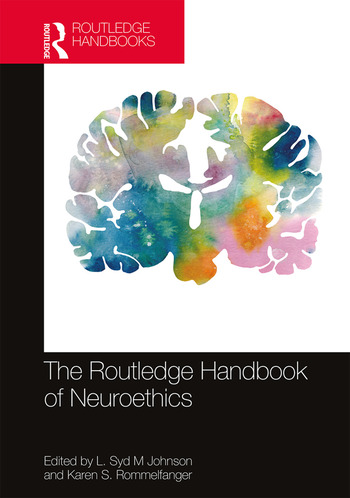 The Routledge Handbook of NeuroethicsEdited By L. Syd M Johnson and Karen S. Rommelfanger / Routledge, 2018 / ISBN 9781138898295 This handbook offers the reader an informed view of how the brain sciences are being used to approach, understand, and reinvigorate traditional philosophical questions, as well as how those questions, with the grounding influence of neuroscience, are being revisited beyond clinical and research domains. It also examines how contemporary neuroscience research might ultimately impact our understanding of relationships, flourishing, and human nature.  NeuroethicsAnticipating the future Written by eminent scholars from diverse disciplines including neurology and neuroscience, ethics and law, public health and philosophy, this volume on neuroethics sets out the many necessary considerations for the future. It is essential reading for the field of neuroethics, neurosciences and psychology, and an invaluable resource for physicians in neurological medicine, academics in humanities and law, and health policy makers. 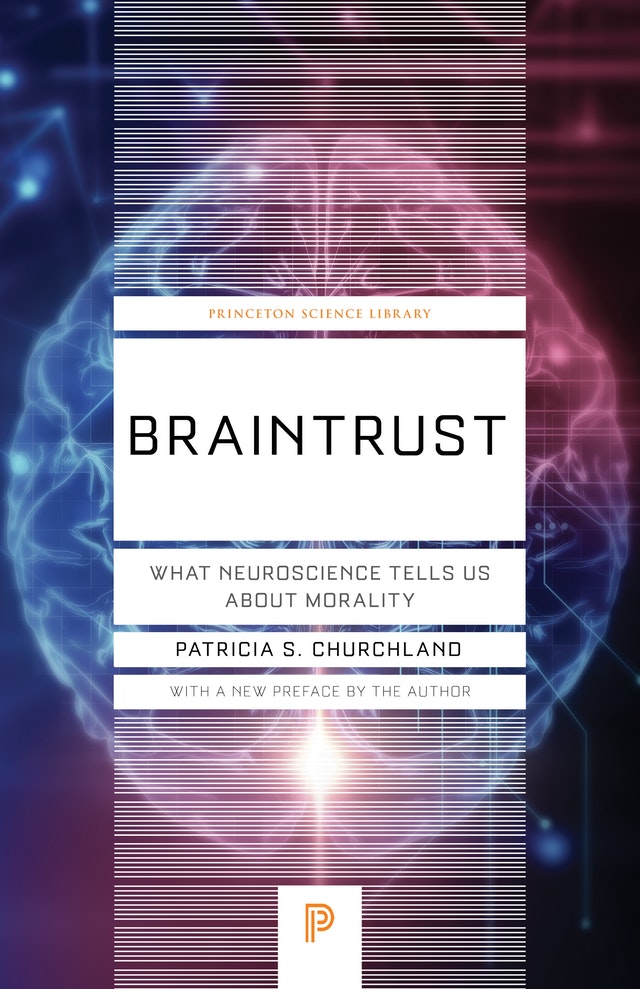 BraintrustWhat Neuroscience Tells Us about Morality In this book, neurophilosophy pioneer Patricia Churchland argues that morality originates in the biology of the brain. She describes the “neurobiological platform of bonding” that, modified by evolutionary pressures and cultural values, has led to human styles of moral behavior. The result is a provocative genealogy of morals that asks us to reevaluate the priority given to religion, absolute rules, and pure reason in accounting for the basis of morality.  The End of Sex and the Future of Human ReproductionHenry T. Greely / Harvard University Press, 2018 / ISBN 9780674984011 In this work of prophetic scholarship, Henry T. Greely explains the revolutionary biological technologies that make this future a seeming inevitability and sets out the deep ethical and legal challenges humanity faces as a result. Deeply informed by his command of both science and law, this book for parents, citizens, and all those, born and unborn, who will face the consequences of a new era of human reproduction. Forget Me Not: The Neuroethical Case Against Memory ManipulationBy Peter A. DePergola II / Vernon Press, 2018 / ISBN 978-1-62273-428-3 This publication contends that any attempt to directly and intentionally erase episodic memories poses a grave threat to the human condition that cannot be justified within a normative moral calculus. Grounding its thesis in four evidential effects, DePergola argues that memory manipulation cannot be justified as a morally licit practice insofar as it disables one to seek, identify, and act on the good.  American OverdoseThe Opioid Tragedy in Three Acts This book reveals not only how Big Pharma hooked Americans on powerfully addictive drugs, but the corrupting of medicine and public institutions that let the opioid makers get away with it. The author tells the story in terms both broad and intimate, of people hit by a catastrophe they never saw coming. Years in the making, its ruinous consequences will stretch years into the future.  Cognitive EnhancementEdited by Fabrice Jotterand and Veljko Dubljevic / Oxford University Press, 2016 / ISBN 9780199396818 This volume addresses issues on cognitive enhancement comprehensively in three important ways: it examines the conceptual implications stemming from competing points of view about the nature and goals of enhancement; it addresses the ethical, social, and legal implications of neuroenhancement from an international and global perspective including contributions from scholars in Africa, Asia, Australia, Europe, North America, and South America; and it discusses and analyzes concrete legal issues and policy options tailored to specific contexts.  Oxford Handbook of NeuroethicsEdited by Judy Illes and Barbara J. Sahakian / Oxford University Press, 2013 / ISBN 9780199680634 The book focuses on and provides a platform for dialogue of what neuroscience can do, what we might expect neuroscience will do, and what neuroscience ought to do. The major themes include: consciousness and intention; responsibility and determinism; mind and body; neurotechnology; ageing and dementia; law and public policy; and science, society and international perspectives. Tackling some of the most significant ethical issues that face us now and will continue to do so over the coming decades, The Oxford Handbook of Neuroethics is an essential resource for the field of neuroethics for graduate students and postdoctoral fellows, basic scientists in the neurosciences and psychology, scholars in humanities and law, as well as physicians practising in the areas of primary care in neurological medicine. 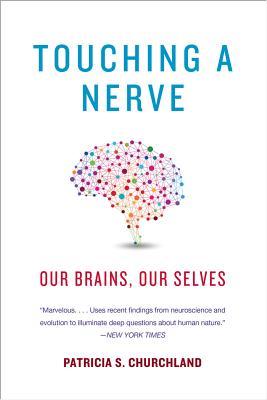 Touching a NerveOur Brains, Our Selves In this thought-provoking narrative — drawn from professional expertise as well as personal life experiences — trailblazing neurophilosopher Patricia S. Churchland grounds the philosophy of mind in the essential ingredients of biology. She reflects with humor on how she came to harmonize science and philosophy, the mind and the brain, abstract ideals and daily life. Offering lucid explanations of the neural workings that underlie identity, she reveals how the latest research into consciousness, memory, and free will can help us reexamine enduring philosophical, ethical, and spiritual questions: What shapes our personalities? How do we account for near-death experiences? How do we make decisions? And why do we feel empathy for others?  Neuroethics in PracticeEdited by Anjan Chatterjee and Martha J. Farah / Oxford University Press, 2013 / ISBN 9780195389784 This book helps to define and foster this emerging area at the intersection of neuroethics and clinical neuroscience, which includes neurology, neurosurgery, psychiatry and their pediatric subspecialties, as well as neurorehabiliation, clinical neuropsychology, clinical bioethics, and the myriad other clinical specialties (including nursing and geriatrics) in which practitioners grapple with issues of mind and brain. Chatterjee and Farah have brought together leading neuroethicists working in clinically relevant areas to contribute chapters on an intellectually fascinating and clinically important set of neuroethical topics, involving brain enhancements, brain imaging, competence and responsibility, severe brain damage, and consequences of new neurotechnologies. Although this book will be of direct interest to clinicians, as the first edited volume to provide an overall comprehensive perspective on neurethics across disciplines, it is also a unique and useful resource for a wide range of other scholars and students interested in ethics and neuroscience. 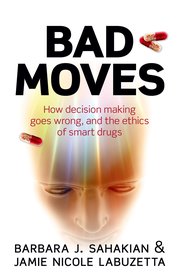 Bad MovesHow decision making goes wrong, and the ethics of smart drugs Authors discuss the process of normal decision making — our strategies for making decisions, biases that affect us, and influential factors — and then describe the abnormal patterns found in patients with conditions such as severe depression, Alzheimer's, and accidental brain damage. Using striking examples and case studies from their own research to show the impact of abnormal decision making, they introduce the concept of 'hot' and 'cold' decision making based on the level of emotions involved, showing that in various psychiatric conditions extreme emotions alter the pattern of decision making.  Emotions, Imagination, and Moral ReasoningEdited By Robyn Langdon and Catriona Mackenzie / Taylor & Francis Group, 2012 / ISBN 9780203803134 The book explores what we can learn about the role of emotions and imagination in moral reasoning from psychopathic adults in the general community, from young children, and adolescents with callous unemotional traits, and from normal child development. It discusses the implications for philosophical moral psychology of recent experimental work on moral reasoning in the cognitive sciences and neurosciences.  Addiction NeuroethicsThe Promises and Perils of Neuroscience Research on Addiction This book examines the ethical implications of emerging neurobiological treatments, including: novel psychopharmacology, neurosurgery, drug vaccines to prevent relapse, and genetic screening to identify individuals who are vulnerable to addiction. It is essential reading for academics, clinicians, researchers and policy-makers in the fields of addiction, mental health and public policy.  The Body PoliticThe Battle Over Science in America The first book to unpack our love/hate relationship with science from our country’s origins to today, The Body Politic is essential reading for science buffs and concerned citizens alike. 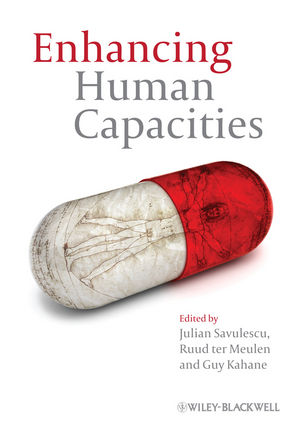 Enhancing Human CapacitiesEdited by Julian Savulescu, Ruud ter Meulen, Guy Kahane / Wiley-Blackwell, 2011 / ISBN 978-1-405-19581-2 This is the first book to review the very latest scientific developments in human enhancement. It is unique in its examination of the ethical and policy implications of these technologies from a broad range of perspectives. It discusses both general conceptual and ethical issues and concrete questions of policy, including sections covering all major forms of enhancement: cognitive, affective, physical, and life extension. 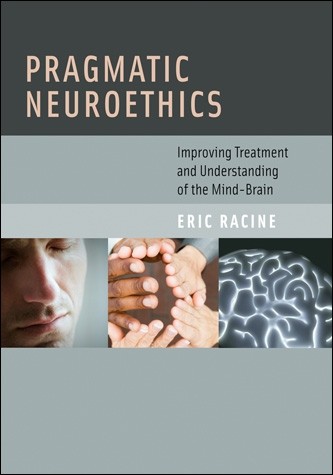 Pragmatic NeuroethicsImproving Treatment and Understanding of the Mind-Brain In this book, the author argues that the emerging field of neuroethics offers a way to integrate such specialties as neurology, psychiatry, and neurosurgery with the humanities and social sciences, neuroscience research, and related healthcare professions, with the goal of tackling key ethical challenges and improving patient care. Racine provides a survey of the often diverging perspectives within neuroethics, offers a theoretical framework supported by empirical data, and discusses the neuroethical implications of such issues as media coverage of neuroscience innovation and the importance of public concerns and lay opinion; nonmedical use of pharmaceuticals for performance enhancement; and the discord between intuitive notions about consciousness and behavior and the scientific understanding of them. 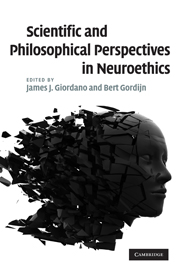 Scientific and Philosophical Perspectives in NeuroethicsEdited by James J. Giordano / Cambridge University Press, 2010 / ISBN 9780511676505 Written for researchers and graduate students in neuroscience and bioethics, this book explores important developments in neuroscience and neurotechnology, and addresses the philosophical, ethical, and social issues and problems that such advancements generate. It examines three core questions. First, what is the scope and direction of neuroscientific inquiry? Second, how has progress to date affected scientific and philosophical ideas, and finally, what ethical issues and problems does this progress and knowledge incur, both now and in the future?  NeuroethicsAn Introduction with Readings In this book, leading neuroscientist Martha Farah introduces the reader to the key issues of neuroethics, placing them in scientific and cultural context and presenting a carefully chosen set of essays, articles, and excerpts from longer works that explore specific problems in neuroethics from the perspectives of a diverse set of authors. Included are writings by such leading scientists, philosophers, and legal scholars as Carl Elliot, Joshua Greene, Steven Hyman, Peter Kramer, and Elizabeth Phelps. Topics include the ethical dilemmas of cognitive enhancement; issues of personality, memory and identity; the ability of brain imaging to both persuade and reveal; the legal implications of neuroscience; and the many ways in which neuroscience challenges our conception of what it means to be a person.  Science Fiction and PhilosophyFrom Time Travel to Superintelligence A timely volume that uses science fiction as a springboard to meaningful philosophical discussions, especially at points of contact between science fiction and new scientific developments. The author draws on a broad range of books, films and television series, including The Matrix, Star Trek, Blade Runner, Frankenstein, Brave New World, The Time Machine, and Back to the Future. It considers the classic philosophical puzzles that appeal to the general reader, while also exploring new topics of interest to the more seasoned academic.  Mind WarsBrain Research and National Defense This book investigates the deeply intertwined worlds of cutting-edge brain science, U.S. defense agencies, and a volatile geopolitical landscape where a nation's weaponry must go far beyond bombs and men. The first-ever exploration of the connections between national security and brain research, this book reveals how many questions crowd this gray intersection of science and government and urges us to begin to answer them.  NeuroethicsChallenges for the 21st Century This book explores questions such as when is it permissible to alter a person's memories, influence personality traits or read minds? What can neuroscience tell us about free will, self-control, self-deception and the foundations of morality? The view of neuroethics offered here argues that many of our new powers to read ,alter and control minds are not entirely unparalleled with older ones. They have, however, expanded to include almost all our social, political and ethical decisions. Written primarily for graduate students, this book will appeal to anyone with an interest in the more philosophical and ethical aspects of the neurosciences. 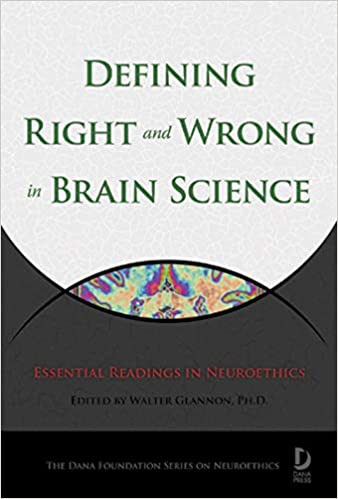 Defining Right and Wrong in Brain ScienceEssential Readings in Neuroethics This book traverses the breadth of neuroethics, exploring six broad areas — including free will, moral responsibility, and legal responsibility; psychopharmacology; and brain injury and brain death — in thirty provocative articles. The scientific and ethical consequences of neuroscience research and technology are plumbed by leading thinkers and scientists, from Antonio Damasio, Martha J. Farah and Paul Root Wolpe. These and other in-depth chapters articulate the thought-provoking questions that emerge with every new scientific discovery and propose solutions that mediate between the freedom of scientific endeavor and the boundaries of ethical responsibility. 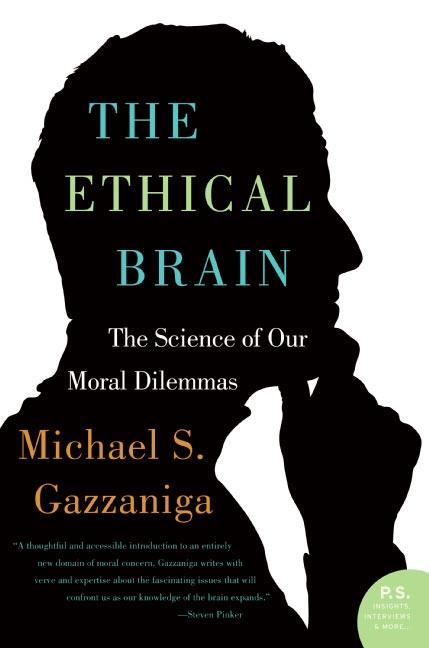 The Ethical BrainThe Science of Our Moral Dilemmas In this book, preeminent neuroscientist Michael S. Gazzaniga presents the emerging social and ethical issues arising out of modern-day brain science and challenges the way we look at them. Courageous and thought-provoking — a work of enormous intelligence, insight, and importance — this book explores the hitherto uncharted landscape where science and society intersect.  NeuroethicsDefining the issues in theory, practice, and policy This book includes contributions from authors representing a wide range of disciplines such as neuroscience, bioethics and philosophy, to law, social and health care policy, education, religion, and film. Their contributions highlight the timeliness of modern neuroethics today, and assure the longevity and importance of neuroethics for generations to come.  Matter and Consciousness, Revised EditionA Contemporary Introduction to the Philosophy of Mind In this book, the author clearly presents the advantages and disadvantages of such difficult issues in philosophy of mind as behaviorism, reductive materialism, functionalism, and eliminative materialism. This new edition incorporates the striking developments that have taken place in neuroscience, cognitive science, and artificial intelligence and notes their expanding relevance to philosophical issues. SeriesAdvances in NeuroethicsSeries Editors: Veljko Dubljevic, Fabrice Jotterand, Ralf J. Jox, Eric Racine / Springer, 2017–Present / ISSN 2522-5677 This book series addresses how advances in brain sciences can be attended to for the benefit of patients and society at large.  Artificial Intelligence in Brain and Mental HealthPhilosophical, Ethical & Policy Issues This volume provides an interdisciplinary collection of essays from leaders in various fields addressing the current and future challenges arising from the implementation of AI in brain and mental health. Contents are structured according to three main sections, each of them focusing on different types of AI technologies: Big Data and Automated Learning; AI for Digital Mental Health and Assistive Robotics; and AI in Neuroscience and Neurotechnology. The book is of interest to a wide audience in neuroethics, robotics, computer science, neuroscience, psychiatry and mental health.  Clinical Neurotechnology meets Artificial IntelligencePhilosophical, Ethical, Legal and Social Implications This volume brings together scholars from a wide range of academic disciplines such as philosophy, law, the social sciences and neurosciences, and is unique in terms of both its focus and its methods. The latter vary considerably, and range from philosophical analysis and phenomenologically inspired descriptions to legal analysis and socio-empirical research. This diversified approach allows the book to explore the entire spectrum of philosophical, normative, legal and empirical dimensions of intelligent neurotechnologies.  Living with DementiaNeuroethical Issues and International Perspectives This book addresses current issues in the neuroscience and ethics of dementia care, including philosophical as well as ethical legal, and social issues (ELSIs), issues in clinical, institutional, and private care-giving, and international perspectives on dementia and care innovations. As such, it is a must-read for anyone interested in a well-researched, thought-provoking overview of current issues in dementia diagnosis, care, and social and legal policy. All contributions reflect the latest neuroscientific research on dementia, either broadly construed or in terms of the etiologies and symptoms of particular forms of dementia. Given its interdisciplinary and international scope, its depth of research, and its qualitative emphasis, the book represents a valuable addition to the available literature on neuroethics, gerontology, and neuroscientific memory research. 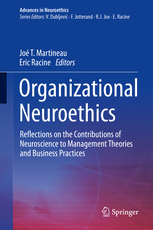 Organizational NeuroethicsReflections on the Contributions of Neuroscience to Management Theories and Business Practices Written by international experts in the fields of management, neuroscience, ethics, and social science, this book will be of prime interest to practitioners, researchers and students in the various fields concerned with improving management research and practices, as well as organizational ethics. The first part focuses on the ethics of organizational neuroscience and several chapters tackle the ethics of neuromarketing or neuroleadership and discuss the ethical issues associated with neuroenhancement practice in the workplace. The second part of the book addresses cutting-edge topics in the neuroscience of organizational ethics.  Neuroethics and Nonhuman AnimalsEditors: L Syd M Johnson, Andrew Fenton, Adam Shriver / Springer International Publishing, 2020 / ISBN 978-3-030-31011-0 This edited volume represents a unique addition to the available literature on animal ethics, animal studies, and neuroethics. Its goal is to expand discussions on animal ethics and neuroethics by weaving together different threads: philosophy of mind and animal minds, neuroscientific study of animal minds, and animal ethics. Given its scope, the book will appeal to scientists and students interested in the debate on animal ethics, while also offering an important resource for future researchers.  Shaping ChildrenEthical and Social Questions that Arise when Enhancing the Young The volume offers a unique collection of articles on pediatric neuroenhancement from an international and multidisciplinary perspective. It is a valuable resource for the different academic communities confronted with questions of how to evaluate and approach enhancement in children and is of interest to neuroethicists, scholars in applied ethics and neurology, psychiatrists and psychologists, as well as scientists developing enhancement interventions for children.  Debates About NeuroethicsPerspectives on Its Development, Focus, and Future This is the first book entirely dedicated to exploring issues associated with the nature of neuroethics. It reflects on some of the underlying assumptions in neuroethics, and the implications of those assumptions with respect to training and education programs, research activities, policy engagement, public discourse, teaching, ethics consultation and mentoring, to name but a few areas of interest. Internationally respected and emerging leaders in the area have taken up the pen to express and debate their views about the development, focus and future of neuroethics. They share their analyses and make recommendations regarding how neuroscience could more effectively explore and tackle its philosophical, ethical, and societal implications. Oxford Series in Neuroscience, Law, and PhilosophyOxford University Press, 2013–Present / NONE  Neurointerventions and the LawRegulating Human Mental Capacity This volume makes a contribution to the field of neurolaw by investigating issues raised by the development, use, and regulation of neurointerventions. The broad range of topics covered in these chapters reflects neurolaw's growing social import, and its rapid expansion as an academic field of inquiry.  The Neuroethics of BiomarkersWhat the Development of Bioprediction Means for Moral Responsibility, Justice, and the Nature of Mental Disorder Neuroscientists are mining nucleic acids, blood, saliva, and brain images in hopes of uncovering biomarkers that could help estimate risk of brain disorders like psychosis and dementia; though the science of bioprediction is young, its prospects are unearthing controversy about how bioprediction should enter hospitals, courtrooms, or state houses. While medicine, law, and policy have established protocols for how presence of disorders should change what we owe each other or who we blame, they have no stock answers for the probabilities that bioprediction offers. The Neuroethics of Biomarkers observes, however, that for many disorders, what we really care about is not their presence per se, but certain risks that they carry. This book should be of interest to those within neuroethics, medical ethics, and the philosophy of psychiatry.  A Primer on Criminal Law and NeuroscienceA contribution of the Law and Neuroscience Project, supported by the MacArthur Foundation Although there was a substantial range of opinion among Project participants about the potential relevance of neuroscience to criminal law, it became apparent that a basic primer or handbook that set forth a statement of the relation as the authors understand it at present would be enormously helpful to practicing lawyers, judges, and legal policy makers as they increasingly were confronted with claims based on neuroscience information. The goal is to provide accurate information and to clarify the basic questions that will inevitable arise so that the criminal law can avoid confusion and mistakes based on inadequate understanding.  Addiction and Self-ControlPerspectives from Philosophy, Psychology, and Neuroscience This book brings together a set of papers, many which grow out of presentations at a conference in Oxford in 2009 on addiction and self-control, by a set of thinkers who are united in believing that understanding agency and failures of agency requires engagement with the best science. The papers it collects attempts to illuminate the mechanisms involved in addiction and thereby to understand to what degree and in what ways actions driven by addiction are controlled by the agent, express his or her will or values, and the extent to which addicts are responsible for what they do.  The Neuroethics of MemoryFrom Total Recall to Oblivion This book is a thematically integrated analysis and discussion of neuroethical questions about memory capacity and content, as well as interventions to alter it. The author uses a framework informed by neuroscience, psychology, and philosophy combined with actual and hypothetical cases to examine these topics and related questions.  Psychiatric NeuroethicsStudies in Research and Practice This book explores these questions in a comprehensive and systematic way, discussing the medical and philosophical implications of neuroscience and the Research Domain Criteria (RDoc) in the fields of psychiatry and mental health. It examines the extent to which circuit-based criteria can offer a satisfactory explanation of psychiatric disorders and how they compare with the symptom-based criteria of the Diagnostic and Statistical Manual of Mental Disorders (DSMV). This book will be of interest to a multidisciplinary audience, including psychiatrists, neurologists, neurosurgeons, philosophers, psychologists, and legal theorists.  Scienze e spiritualitàLa trascendenza tra cultura, ricerca neuroscientifica ed evoluzione "This book aims to explore, through the use of new brain imaging neurotechnologies, the changes in the neuronal circuits of different brain areas in states of intense meditation and prayer. Neurosciences are now offering new research perspectives in a field that until recently was considered a philosophical or religious competence only.Le neuroscienze stanno oggi offrendo nuove prospettive di ricerca in un campo fino ad ora ritenuto di competenza esclusiva delle religioni. Questo saggio affronta l’analisi dell’esperienza spirituale, vissuta e studiata in contesti diversi, in tono semplice e divulgativo, e spiega il funzionamento delle tecnologie e degli strumenti utilizzati nella ricerca. Nel rapporto tra spiritualità e strutture cerebrali, tra preghiera e neuroteologia, si aprono nuovi orizzonti di indagine scientifica in sintonia con le riflessioni del gesuita Teilhard de Chardin, che già nel primo Novecento immaginava una convergenza di religione e scienza." |
